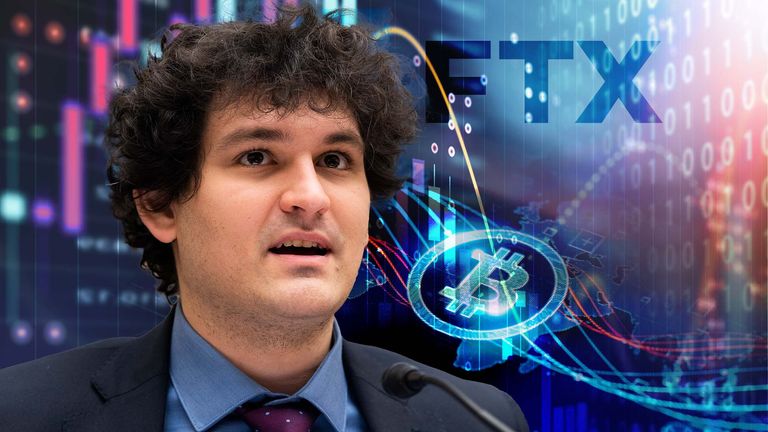The sight of Sam Bankman-Fried, an annual symbol of the cryptocurrency space, being thrown out of court in Nassau, driven to the airport in a black SUV, and extradited to New York is a harrowing sight.
2022 has come to an abrupt and unforgiving end for the most high-profile player in the cryptocurrency space.
The man who hosts celebrities, prime ministers and presidents in shorts and T-shirts is no longer that eccentric nerd whose genius could unleash the potential to earn digital billions.
Instead, he is the face of massive fraud, accused of using client funds at cryptocurrency exchange FTX to cover his wrong bets and finance a Bahamian penthouse lifestyle while preaching the teachings of altruism that his Millions of dollars are passed for the less fortunate.
His closest associate in the industry, his co-founder and girlfriend who once ran his crypto hedge fund, has turned around, pleaded guilty to wrongdoing and presented evidence against him, prosecutors revealed Wednesday .
SBF, as he is sometimes known, insisted that none of this was intentional and that the pumping of client funds into his private account was the result of incompetence rather than bribery.
But with tens of millions of those dollars spent in political donations, embarrassing Washington with celebrities like Tom Brady — who’s been hyped up in FTX’s lavish marketing campaign — the outlook is bleak.
Is it inevitable?
The question for the crypto industry and the broader digital asset space is whether the collapse of FTX is a necessary symptom of an industry that promises magical value from electronic ether, but has always lacked trust and credibility and is fertile soil for corruption.
Or is SBF, as his FTX CEO successor claims, just an old fashioned embezzler whose alleged crimes are only complicated by the fact that they are hidden in plain sight? If so, isn’t the future of digital assets forever stuck in wild volatility or questionable assets, sudden crashes and downsides?
It’s been a grim year, with a string of summer debacles, including crypto lenders Celsius and the Terra-Luna network, its own fugitive scandal, Do Kwon, the subject of a South Korean arrest warrant, and Interpol’s red note .
Those crashes wiped out billions of dollars, with the original cryptocurrency bitcoin plunging 75% in value and losing some more, much of it from retail investors willing to trade real money for the digital ciphers that keep the crypto machines running.
Economist Frances Coppola and prominent cryptocurrency skeptic said these events were the result of an inherently unsound product accelerated by the broader economic environment, in which case, No more cheap money to fill wine bowls.
“When cryptocurrency came along, it promised a lot and delivered very little, except for a lot of bubbles that then popped spectacularly,” she said. Three major ruptures, from which it is unclear when or if it will recover.
“I think FTX and others, Terra, Luna, Celsius, are a phenomenon of the crypto bubble that we’ve seen in the last two years. It’s not surprising that when the Fed is in mourning, it’s all in mourning [US Federal Reserve] Start tightening monetary policy along with other central banks and withdraw from the global economy all the money that was pumped in during the pandemic. “
The Wildly Volatile Part of Crypto’s Attraction
The wild and costly volatility this year appears to be a fundamental part of the appeal of cryptocurrencies. Speculation and the ability to capitalize on staking at scale by borrowing from exchanges feels more like gambling than investing, a retail version of the frenzied derivatives trading that was exposed to public view at dire costs in 2008.
That hasn’t stopped mainstream investors from taking greater interest in cryptocurrencies. Some of the largest U.S. venture capital funds are losing money on FTX, and banks are responding to demand from institutional investors reluctant to leave estimated trillions of dollars in new digital assets on the table.
Standard Chartered’s Waqar Chaudry told me that the next two years will be key to mainstream participation in digital finance: “We believe digital assets are here to stay for a long time. Banks’ main job is to serve customers where they need them.
No matter where you get the podcast, you can click to subscribe to Sky News Daily
“From an institutional banking standpoint, there is a need for large institutions to enter the cryptocurrency space. So where they enter the world, they need service providers who have experience in financial services and they are talking to us about their What’s the plan and what’s going to happen over the next 12 to 24 months.”
Meanwhile, the corporate world is taking a hard look at the technology behind it. These “distributed digital ledgers,” in which watertight cryptography and networks of public examiners replace clearinghouses or intermediaries, have long seemed to have transformative potential.
For years, blockchain seemed like an answer to the right questions, but many lines were becoming clear.
economy of things
Philip Skipper, head of IoT technology at Vodafone, says they are critical to the next step in digital life, the “Economy of Things”.
“We already have devices that we can communicate with. The economy of things is when these devices communicate and transact with each other.
“So you can drive on the road, your electric car can communicate with traffic lights, you can buy congestion charges for the next 50 yards. It’s the ability of these devices to connect and transact with each other. That’s the economy of things. It’s you who underpins it How do you tie all these games together, and that’s where blockchain plays a key role.”
Global supply chains disrupted by COVID can also be transformed by this technology. The combination of blockchain and stable digital currency opens the door to smart money that can link payment to quality and delivery at every stage of the production process.
The flip side of this concept is a state-controlled currency that limits the ability of citizens to spend money when they choose. Imagine that benefits are paid only in approved digital coins and can only be unlocked for approved products.
The good and bad potential of these technologies puts the role of regulators and governments at the center, and the importance of a public debate about what exactly we want with our money.
Lack of regulation has been a common theme in this year’s catastrophic failures of cryptocurrencies. Ironically, for a technology that promises to bypass mainstream institutions, they will be central to shaping the future of cryptocurrencies and blockchains.



